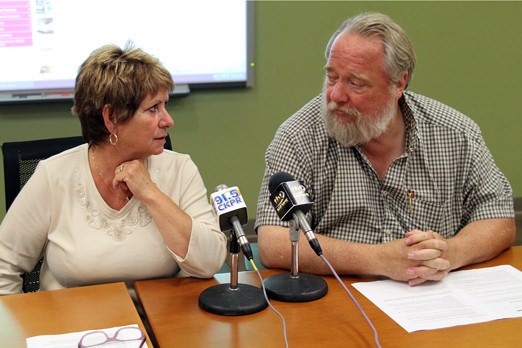Should the city face a class-action lawsuit over flood damage and lose, claimants won’t be able to double dip and take money out of the disaster relief fund too.
It’s just one of several myths surrounding the flood-claim process that committee members Wayne Fletcher and Lynn Peterson attempted to debunk on Wednesday, as rumours continue to float around the city in the aftermath of the May 28 flooding and sewage back-up disaster that struck thousands of Thunder Bay homeowners.
The statement of claim, which could ultimately lead to a $500-million class-action lawsuit being filed against both the city and province, has only six names attached to it at this point.
“If the lawsuit goes through and they get an award, then everything they receive from us and from Safe Homes has to be (paid back),” said Fletcher, chairman of the Disaster Relief Committee. “Any support at all.”
That includes money received from the Salvation Army or Red Cross.
“We’ve been informed by legal council that the judge, if and when it gets to that point, which will take a long time no matter what, will have to take that into account. So there will be no double dipping. That’s what I think people are afraid of,” Fletcher said.
As it stands, the committee has collected about $750,000 of the $5 million it’s hoping to collect, money the province will match on a two-for-one basis.
Fletcher said they likely won’t continue to fundraise beyond the end of the year, and acknowledged it’s a lot of money to be asking for in a community that struggled last year to come up with $2.5 million for the 2011.
But he’s not worried.
“Are we panicking? No,” he said, adding he doesn’t think people are withholding donations because of double-dipping fears or that money collected will be used to pay bloated administration costs.
They’re just being cautious, Fletcher said.
“They should be aware that at the end of this whole process, when we’re finally done and we’ve given out the money, we’ve done all the claims, we’ve done all the fundraising, we have a very strict financial accounting that we have to go through to present both to city council and to the ministry, so that everything is above board,” Fletcher said.
“If you give money to the disaster relief fund, that money can only be used for people who have claimed. It doesn’t go anywhere else. That’s the money that gets matched … Is it the nature of the beast? I think it’s just people wanting to be prudent. And there’s nothing wrong with that.”
Every caution will also be taken to ensure people with insurance aren’t trying to file claims and double dip that way.
Peterson said an insurance adjuster will be combing through every claim and double-checking the claimants are either not insured or under-insured.
“They have that expertise,” Peterson said, adding they’ve talked to officials from Goderich and Peterborough, the only other cities to file under the Ontario Disaster Relief Assistance Program, to see how they dealt with the problem.
Peterson wanted to clear up one more misunderstanding.
“There’s a belief there is a $16-million pot out there. If you look back when the minister was in the city, I think the word was there was up to $16-million available. I think $10 million was for infrastructure and the rest of the money was for flood relief,” Peterson.
“The up-to part, I think, got missed. The process is they will match two-to-one for every dollar raised. So that means we have to raise the money first in order to leverage the two-to-one … That will be the pot we will be able to pay the claims out of.”
The committee intends to approach individuals and businesses to add to the collection, and intend to approach other municipalities for support as well.
As for local fundraisers, a loonie day is being planned, likely for the Labour Day weekend.
